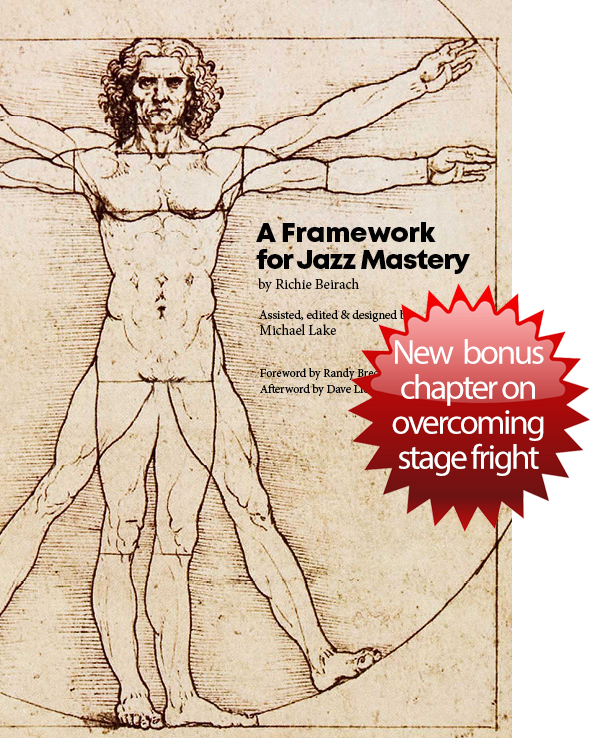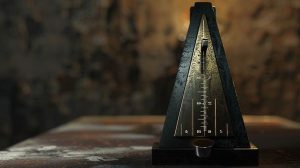
The Benefits of the Ear to Instrument Connection
I recently watched a video performance by the amazing classical pianist Yuja Chang. I’ve seen her memorizing motion and heard her virtuosic playing before, but something hit me after seeing
Categories:
Categories:
“Perfection is achieved, not when there is nothing more to add, but when there is nothing left to take away.”
– de Saint-Exupéry
Richie Beirach and I published our first soft cover book last week titled A Framework for Jazz Mastery. In that first week we sold far more than we anticipated. Thank you!
We used some new technologies to communicate about the book using marketing platforms and techniques unique to promoting books about jazz.

But the most curious aspect to me about the book is its length. Actually I’ve become intrigued with the whole topic of book lengths.
In 2011, average book length was 467 pages. by 2017, that number had plummeted to 273. The average best-selling book length has dropped by 42% in the last 7 years.
I’m highlighting this aspect of books because I believe particularly for non-fiction, a long (200 page+) book can actually be less effective at conveying the material and at providing the reader with the full experience the author intended.
Speaking for myself, many non-fiction books I’ve read could convey their thesis in one third of the book’s pages. Some good stuff is probably further into the book but I’m already satiated. Think about the books you’ve bought that you haven’t finished. Be honest. More than 10? 20?
It’s not your fault. It’s the author’s. Well, actually it’s our culture that preaches more is more. The author bought into it perhaps by the prompting of her publisher. “Books need to be substantial to sell. Keep writing more.”
I think thickness and page-count matters less and less in books and eBooks in this hyper-distracted world. The stats above seem to point that out.
In 2011, average book length was 467 pages. by 2017, that number had fallen to 273. The average best-selling book length has dropped by 42% in the last 7 years.
Back to Richie’s book, A Framework for Jazz Mastery. It’s 40 pages and can probably be read over a weekend of chipping away at it. I hope that’s how it is read because you’ll enjoy your sense of completion and then turn to implementing some of the things you learned. And then return to the book to easily find the parts you wish to review.
I received a note today from a purchaser who complained that the book is thin. There’s not as much paper between the covers as he feels should warrant the price. I wrote him back that I respected his perception of value but asked if he had read it. He had not. So I suggested that he open it up and take a look, and if he still feels there’s not $30 worth of value to him, I’ll happily refund every penny it cost him. He has not yet asked.
Time will tell if buyers will value the book’s content over its heft. I want readers to digest Richie’s dense wisdom and teaching quickly so that they can apply it now.
Think about our ‘more is more culture’. Bigger portions of food at restaurants (“Supersize me.”), bigger homes (the average size has been growing steadily), access to news (care to watch for the entire 24 hours?). Sometimes bigger is better, like the size of your bank account!! But can we rethink the whole size thing in relationship to books that purport to teach?

How much is it worth to discover within A Framework for Jazz Mastery how a great jazz player developed and describes his lightening fast connection with his fingers so that you grasp how to gain that for yourself? Or some simple methodology for reharmonizing tunes along with the specific 20th Century Classical pieces for modeling that guide your ear to finding more interesting alternative chords for your favorite standards?? Or the specific things you should do to develop the routine and discipline for effective practicing in order to become the player you imagine you can be?
What is the value of the leveling up in your playing and musicianship once you pay attention to and implement these types of important lessons?
I received a promotion today for a book by a well-known jazz player. The book is 367 pages. I looked through the 25 preview pages and saw not one graphic, picture, or break in the thick text other than chapter divisions. Now maybe all that fun stuff is later in the book but what I saw is an example of a long and difficult book. To paraphrase Zuckerberg’s girlfriend at the beginning of the film, The Social Network, “Reading this is like reading a stairmaster!”

Would this musician have made it a better book by condensing all that into 100 pages rich with graphics, pull-quotes, and sidebar elements in order to make it a more effective conveyance of the materials? Or was his publisher more focused on word-count?
There is a place for long books. Fiction like Moby Dick, Atlas Shrugged, and War and Peace needed every word in every page to fully tell their stories. Your book may be better served using a different standard – one of efficiency and ease of comprehension.
I’d like to propose a better standard for books. Rather than using thickness to demonstrate worth, strive to provide the greatest value in the shortest time. Honor your reader’s busy and highly distracted life. And make reading your book fun. Allow your reader’s brain to comprehend the material more fully so that his life changes in some specific way through implementing more from your important material.

Trombonist, author, marketer, & tech guy
Share this post…

I recently watched a video performance by the amazing classical pianist Yuja Chang. I’ve seen her memorizing motion and heard her virtuosic playing before, but something hit me after seeing

I have created a AI chatbot called Jazz Master Chat that draws from 75 hours of interviews from my Jazz Master Summit event a couple of years ago. I interviewed

What is jazz improvisation? Let’s first define what I mean by jazz improvisation. Jazz improvisation is a spontaneous conversation, but instead of words, we use notes. Look at two possible

My recently turned 18 year old son is a passionate photographer He 8217 s got himself a little business

A couple weeks ago I sent Richie Beirach a YouTube clip from the movie Whiplash as a bit of

I originally meant to write this as a reply to a comment Richie Beirach wrote on my blog But

Tools for helping musicians at all levels learn about jazz and play to their full capability.
Web design and marketing by:
Michael Lake @JazzDigitalMarketing.com
This is just a fake book example for the type of website I can build for you. Just trying to use a little humor here!